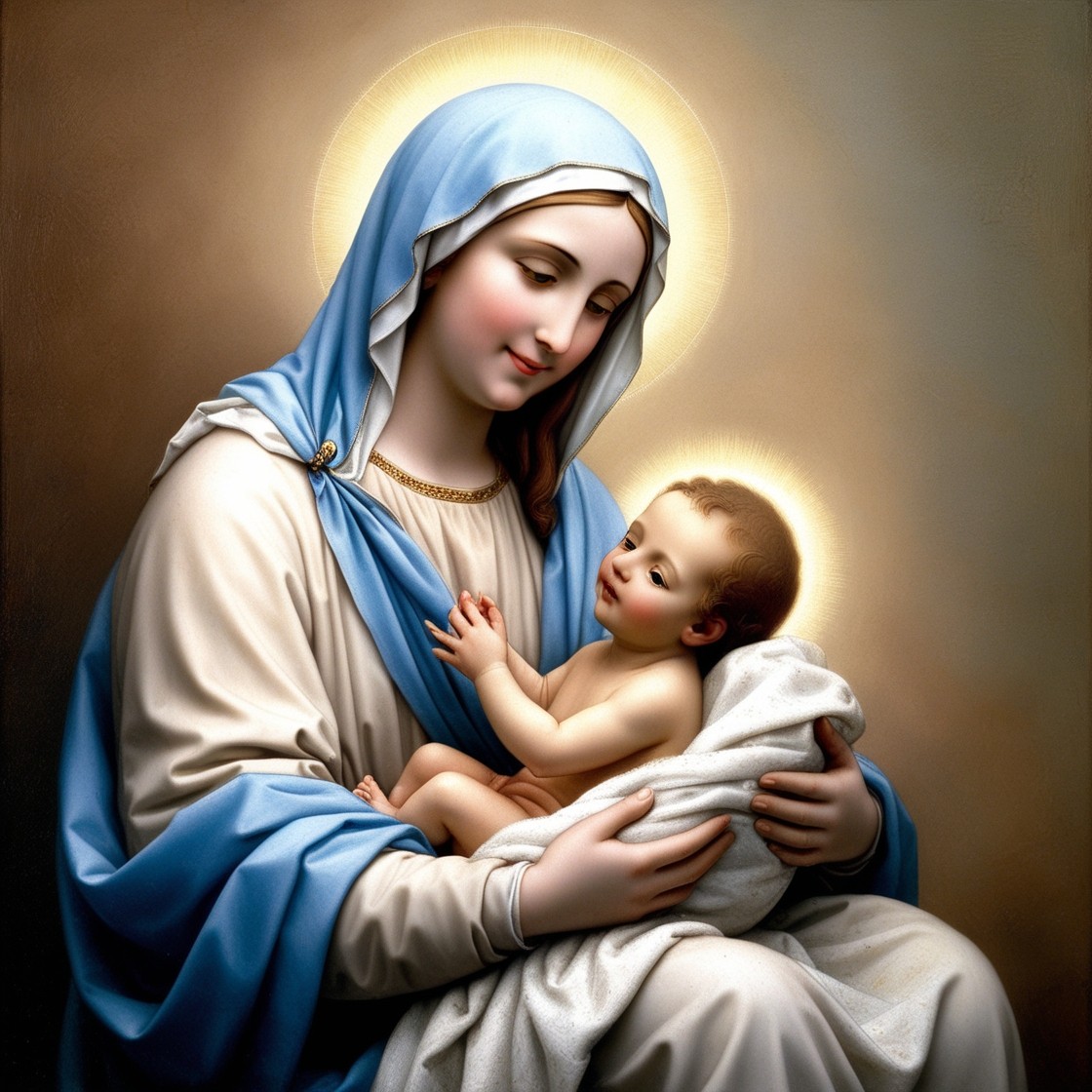
And so it is Christmas. A special time, heavy with significance. Still. Despite the unwanted changes wrought upon us, Christmas is still special. It’s ours, and its magic brings out the innocent child in us.
It’s a time for family, especially children, who thrill at the thought of it and can see its magic much better than those of us jaded with years. But even the most cynical of us can feel the power of its pull, as symbolised by the essence of its message and the beauty of that most poignant picture of all – a young mother nursing her child.
Christmas holds a special place in our (British) heritage and identity. It is rooted in centuries-old tradition, having been celebrated in one form or another for over two thousand years. Think of that, more than 70 generations have celebrated on or around 25th December as best they could. All our ancestors, for seventy generations. In peace and war, in times of plenty and times of want, for seventy generations and more our ancestors have celebrated the re-birth of the light and the birth of their saviour.
By about 350AD most of the natives of Roman Britain were Christian, but even before that ‘the coming of the light’ was celebrated in the days after the winter solstice. The Anglo-Saxons brought their own post-solstice tradition with them, Géol, or Yule, the word possibly coming from the same root as ‘jolly’ and which later merged seamlessly with Christmas as Christianity displaced the old gods, Tiw, Woden, Thunor and Frig, living on still as Tuesday, Wednesday, Thursday and Friday. Our tradition of the Yule log comes directly from the ancient Anglo-Saxon – and Germanic - tradition of bringing evergreen branches indoors to symbolise life during winter
For time out of mind therefore, Christmas has been a time when the nation comes together to celebrate not just the birth of Jesus, but also our values, family, generosity, and community. The British Christmas is a tapestry woven with historical customs, cultural practices, and a shared sense of belonging that transcends generations, the gone generations to whom we owe a sacred trust, the generations that fought for our freedom.
The first recorded Christmas feast was held in 521 AD, in York. Over the centuries, the festival evolved, incorporating elements from pagan winter solstice celebrations, Roman Saturnalia and Christian nativity traditions. The Victorians added their own, popularising the Christmas tree and Charles Dickens' "A Christmas Carol" immortalised the spirit of Christmas with its themes of redemption, compassion, and goodwill. A time of giving.
We remember warmly Christmases past, when we were young; the Advent calendar, Christmas crackers, and the Yule log. Christmas dinners of legend, of turkey, goose, or chicken. Stuffing, lots of stuffing and Christmas pudding. Carols, such as "Silent Night" and "Hark! The Herald Angels Sing," echo through our memory, creating an atmosphere of reverence and joy. And grandmothers tipsy on port or sherry joining their husbands, merry with spirit, in choruses of ‘Danny Boy’.
The tradition of sending Christmas cards, which originated in Britain in the 1840s, reflects the importance of maintaining friendships and expressing goodwill. More recently, the Queen's Christmas Message, reinforced British national identity, when the nation paused to listen to its monarch with a sense of continuity and shared experience.
We watched the same TV shows, the whole nation laughing at Morecambe and Wise, and singing along with Des O’Conner and Shirley Bassey. We all got the jokes. We knew the words; we were a part of the whole. We were a ‘we’,
So Christmas in Britain is not only a religious celebration, but also one of our heritage, culture, and identity. It is a time when historical traditions come alive, families unite, and the spirit of generosity flourishes. It can be argued that Christmas encapsulates the essence of what it means to be British, reaffirming the commitment to the values of compassion, community and unity that define British heritage and identity.
And as a vital cultural icon, Christmas must be protected and defended as, like all our heritage and values, it is under attack. The enemies of the nation state and national identity hate it and have been working to undermine it for years.
Christmas is now often referred to as Winter Festival and instead of Merry Christmas we see the jarring “Happy Holidays” seeping through academia, the public sector and MSM. Councils have been caught axing the very word Christmas. UK philosophy lecturer Dr Joseph Millum argues that the Santa story “breaches trust” and could cause “worry and upset” and an academic from the University of St Andrews in Scotland writes: “For many children, the winter holidays centre on a lie,” and the National Trust has dropped Father Christmas for Mrs Claus at Santa’s Grottos as their festivities go woke.
And even the Church is in on it, with CoE priests told to give ‘context’ of Christmas carols ‘so diverse communities feel welcome’ with carols given warnings for stating that Jesus is the “true Messiah”. Just writing that made my head spin, Christianity’s central doctrine now comes with a trigger warning in case it upsets ‘minorities’.
Up with this we most certainly should not put, so please make this Christmas special, and celebrate it loudly and proudly. And let’s make sure that 2025 is the year Wokery is returned to the lunatic asylum where it belongs and the new woke puritans are hounded out of all positions of power.
Intolerant puritans have tried to ban Christmas before, in the 1650s. We need to make sure that the new lot meet the same fate as the old ones, and that Christmas is around for another five hundred years.